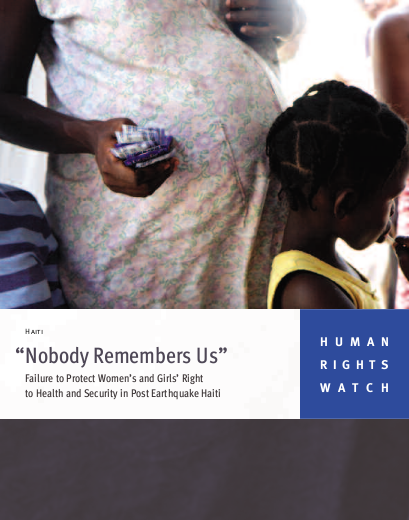
Based on research conducted in Port-au-Prince in late 2010 and early 2011—and interviews with 128 women and girls living in 15 displacements camps in 7 of the 12 earthquake-affected communes—this report looks at women’s and girls’ access to reproductive and maternal care in post-earthquake Haiti. It examines the impact that food insecurity has on reproductive and maternal health; the reliance on transactional sex that some women and girls have developed in order to survive; and their vulnerability to, and the consequences of, gender-based violence (GBV). It also considers Haiti’s human rights obligations, and the need for mutual accountability between the government and donor states and non-state actors in the country. The report finds, 18 months after the earthquake, the voices of women affected by the earthquake have been excluded from the reconstruction process—even though women are integral to the country’s economy. Moreover, initial optimism felt by international aid agencies and donors that access to maternal health would improve in areas affected by the disaster has not been realized for all women and girls. This is despite an outpouring of international support and of new, free services run by international nongovernmental organizations (NGOs) that promised to remove the geographic and economic barriers that had historically prevented women and girls from accessing health care. For the women and girls interviewed by Human Rights Watch in the camps, their enjoyment human rights, such as the rights to life and health, remains poor (not withstanding benefits accruing from the presence of free care and experts on the ground), and most of them lack basic information that would allow them to access available services. Indeed, as is widely recognized, Human Rights Watch found evidence of three types of delay that contribute to pregnancy-related mortality: delay in deciding to seek appropriate medical care; delay in reaching an obstetric facility; and delay in receiving adequate care when reaching a facility. For the women and girls we interviewed, these delays occurred because women and girls did not recognize signs of early labor or were unfamiliar with a new neighborhood; because the places where they previously received care had been destroyed in the earthquake; because of distance, security concerns, or transportation costs; and because of inadequate care at facilities.
Resource collections
- Accountability to affected populations (AAP)
- Earthquakes
- Learning from crises
- UN Habitat - Urban Response Collection
- Urban Response - Urban Crisis Preparedness and Risk Reduction
- Urban Response Collection - Community Engagement and Social Cohesion
- Urban Response Collection - Economic Recovery
- Urban Response Collection - Environment and Climate Change
- Urban Response Collection - Housing, Land and Property
- Urban Response Collection - Urban Crisis Response, Recovery and Reconstruction
- Urban Response Collection - Urban Resilience